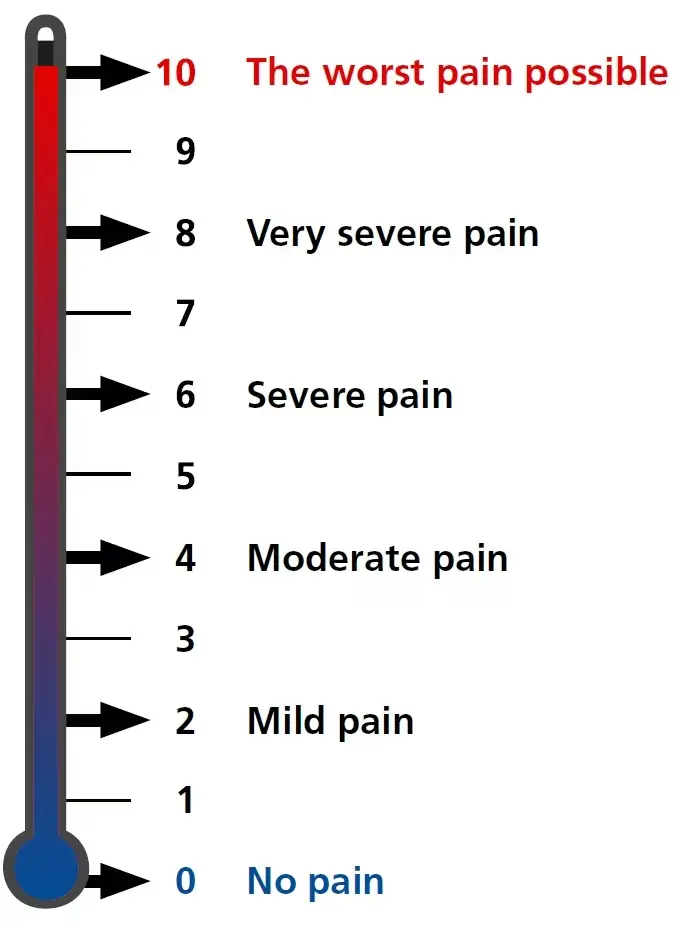When coming into hospital, many people are understandably worried about pain. However, with your help we can work together to keep your pain to a minimum.
The aim of pain relief
We aim to control your pain to a level that allows you to do the things you need to do to get better. It is particularly important that you are able to move around, cough and breathe deeply as this reduces the risk of complications such as:
- bed sores
- stiff muscles and joints
- chest infections
- blood clots in your legs.
Rating your pain
Whilst in hospital you will be asked regularly to rate your pain. This will give us an idea of how much pain you are in and whether your treatments are effective. The way we do this is by asking you to give your pain a number between 0 and 10. Zero indicates that you have no pain and 10 represents the worst pain you can imagine. There is no right or wrong answer – only you know the amount of pain you are in.
This method of rating pain does not suit everyone as some people find it hard to simply pick a number to represent their pain. If this is the case, don’t worry as we have different ways of assessing your pain. These can be discussed with you by your doctor or nurse.

Asking for pain relief
Good pain relief is important and some people need more of it than others. Please ask for pain relief before you get too uncomfortable. Letting your doctor or nurse know early, makes it easier to control the pain by giving you pain relief sooner rather than later. If you find you are not getting relief from any treatment that has been given please tell a nurse so that further steps can be taken.
Pain relief after your operation
Controlling pain will help your recovery and assist in reducing complications. There are different types and ways that pain relieving medications are administered
- Paracetamol – this is an effective medication for pain but also helps when taken with stronger pain killers, so the majority of people will be offered this.
- Non-steroidal anti-inflammatories – this includes medication like ibuprofen, and people who can tolerate these may be offered them as well.
- Opioids for mild-moderate pain – these are often in tablet form, for example codeine and tramadol.
- Strong opioids – including morphine, fentanyl and oxycodone, which may be a tablet, a liquid or an injection.
- Patient Controlled Analgesia (PCA) – some patients undergoing major surgery will have a device in which there is a button that delivers a dose of strong painkiller when pressed. Your nurse will explain how to use this when you are in recovery.
- Infusion of local anaesthetic – sometimes people have a continuing infusion of local anaesthetic. One type of these is an epidural, which is placed in the space around your spine. Others will be close to the site where you had your operation. A small catheter remains in that area and delivers an infusion of local anaesthetic to help give you pain relief. Such infusions can provide excellent pain relief. Your anaesthetist will discuss these in more detail if one is being considered.
Are there any side effects?
As with any medications some people may suffer side effects which commonly include drowsiness, feeling sick and constipation. It is important to remember that these can be easily treated and need not delay you going home.
Pain myths
“Aren’t pain medicines addictive?”
Don’t worry, when pain medications such as morphine are taken to relieve pain after an operation, the chances of addiction are extremely small.
“Enduring pain builds strength and character.”
‘Toughing it out’ may in fact be detrimental after surgery. Pain can wear you down and pain that prevents you from coughing or moving may delay your recovery and cause complications. Pain should be treated as soon as possible, as it is much easier to treat then – please tell us about pain before it becomes too severe.
“Complaining of pain will distract my doctor from treating me.”
This is not the case. It has been shown that people recover faster and suffer fewer complications when they have less pain. Therefore, it is crucial that you talk about your pain to help your doctor treat you in the most effective way and help you recover faster.

